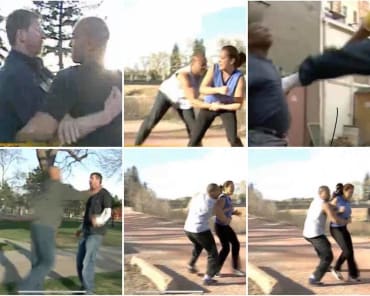Does Strength Matter?
If you have trained or have been an instructor for any length of time, you have either asked this question or have been asked the question of “Does Strength Matter?” Being Colorado Springs the home of many military installations, I am asked that a lot. With martial arts and karate schools all over, people often times receive and answer, but is it the right answer?
During my many years of training, I have heard many different answers to that question. Some made sense, most answers, I believe, were just made up answers to get me off of my instructors back. The only other question I think that I have heard more is “Does size matter?” Anyone who has ever worked out in a gym has been asked that question. Does size help or hurt you when protecting yourself? The question of size and strength sometimes seem to be a synonymous one, but actually they are different.
Let me be blunt. Of course strength matters. Ask any person who is unable to get himself or herself out of bed in the morning. Or ask the person who is unable to pick up his or her child. Or ask the person confined to a wheel chair. We need strength to simply operate on a daily basis. The real question is “How much strength is needed?” That depends on several contributing factors:
- What is the task you are performing?
- How well do you KNOW the technique you are performing?
- How skilled is your attacker?
- How strong is your attacker?
These are just some of the contributing factors. Let me break them down briefly. Actually, the first and second factors can be answered at the same time. The technique that you choose to use in any given confrontation should be dependent upon several factors such as:
*the attackers height
*the attackers weight
*the attackers perceived strength (relative to your own)
*and the surrounding conditions (outside or inside, space available, temperature, surface you are standing on)
And these are just to name a very few. I know, I know, “None of that should matter. In Karate size and strength doesn’t matter.” Ok, let’s get past the fiction and focus on the reality. If you are 110 pounds at 5’ 3” and the person you are defending yourself against is 250 pounds and 5’8” tall with all of his weight being at his midsection, should you attempt a hip throw? I think not. I guess in this situation, size did matter. In addition, strength would be an issue as well. Why? Because even if you as the defender are able to get your hips below the attacker’s waist to attempt the hip throw, you may loose the power of the push of your hip, the pull of your arm and the push of your arm around the attackers waist, all of which is needed to break the balance of your attacker and successfully flip/throw this attacker.
In short, because of his size you have lost the strength needed to correctly perform this technique. (This is the very reason why we here at CFMAF teach several techniques for each grab. This supplies you with many techniques (options) to choose from for variables such as this.) Therefore, I guess in this situation, strength did matter.
As I have said in the previous paragraph, factors number 1 and number 2 can be answered at the same time. If you truly KNOW the technique that you are performing than you would recognize the evident factors that lead to the success or failure of the performance of that technique. By knowing fully understanding the limitations of the technique of choice, you would be able to “flow” to another technique that would have a higher probability of success. One that is not as deeply rooted in strength and size as a hip throw, such as an eye gouge or throat strike (these too have limitations based upon the factors I have already stated above.).
I mentioned that at CFMAF here in Colorado Springs, we teach several techniques for each grab. This allows our students to be able to use the appropriate technique for the confrontation at hand. However, repetition in training is key. Repetition will prove to show how well you actually KNOW the technique and when to apply it.
Now to the third factor “How skilled is your attacker?” Why should that make any difference to the technique you choose to use? That is a simple answer. Fortunately, or unfortunately (depending on your perspective), many street fighters have more experience in fighting than most martial artists. In the same token, many career criminals study their chosen craft of crime (i.e. assaults, sexual assault) with more fervor than the typical martial artist does. If you know of the person who is attempting to assault you and you know that this person is a good boxer/puncher, should you attempt to box with this person? Should you attempt to “trap” his punch? If you answered yes, then good luck J. Common sense would tell you to use other techniques that would eliminate or reduce the strength of the attacker’s hands.
I can read your minds right now (that is a secret gift given to those who have been in the martial arts for as long as I have. I can also float threw the airJ). I bet you are thinking, “What if you don’t know this person? How do know how skilled he or she is?” That is a good question. You may not know of the attacker’s skill level. Because of this you should always execute your techniques as if you are confronting someone as skilled or more skilled than you. However, if you are being aware of what is going on in your own community and there are reportings of car jackings, sexual assaults, robberies, burglaries, etc. and you are confronted with this particular situation than you should assume that this person is skilled. Why? Because this very situation has been reported in your area and the person(s) involved in these types of assaults have yet to be captured. With this being in mind, the selection of the technique you choose should be a clean, short, and decisive technique. Will the strength or size of the attacker as well as your own size and strength be a contributing factor when determining which technique to use? Most definitely.
Now finally the last factor, “How strong is your attacker?” I believe the answer to this question has been supplied by the paragraphs previous. Strength may not be the only deciding factor in successfully surviving an attack, but it is most definitely a factor. As a world champion once said to me “Strength may not be the only factor, but it sure helps.” We can try to tap dance around this issue any way that you would like, but the fact is that strength contributes to the outcome of a physical altercation. The good part is strength is something that we can all improve upon through hard work. By selecting CFMAF as your martial arts school you will have a conditioning regiment as well as reality skills that will prove to increase your probability of surviving a street altercation.
Maybe a better question to ask would be “Which factor more importantly contributes to the outcome of an altercation?” That would be a harder one to answer, but believe me I could do it J. I’ll leave that discussion for a later time. All of this typing has made me weak and I simply don’t have enough strength to continueJ. See I told you, Strength matters.



